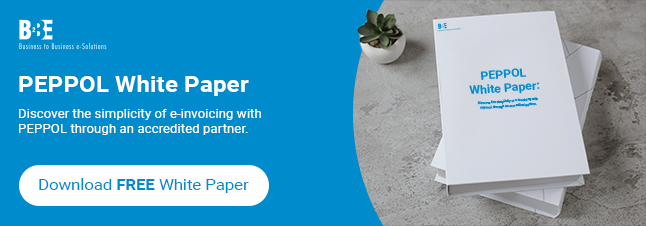In today’s interconnected world, businesses look for new ways to streamline their operations . They do so often in the hope of reducing costs and increasing efficiency. One solution that’s gained more popularity in recent years is PEPPOL, or the Pan-European Public Procurement Online. But, what is PEPPOL? It’s a network that allows businesses to exchange electronic documents with their trading partners in a standardised and secure way.
This blog will take a closer look at what PEPPOL is and how it works. As well as exploring whether it might be the right choice for your business. So, whether you’re a small business owner or a procurement professional at a large organisation, find out more below. You can also head straight to our white paper to find out more about the Nuances of Adopting PEPPOL via Accreditation vs Connecting via an Accredited Partner.
What is PEPPOL?
PEPPOL, or the Pan-European Public Procurement Online, is a standardised network that allows businesses and government agencies to exchange electronic documents with their trading partners in a secure and simplified way. The network is based on a set of technical specifications and protocols. These protocols ensure interoperability between different systems and service providers.
PEPPOL was developed originally by the European Union to simplify public procurement processes and promote cross-border trade within the EU. However, the network has gone on to expand beyond this use and is now widely adopted by private sector organisations across Europe and beyond.
At its core, PEPPOL is a set of standards for the exchange of electronic business documents. For example, purchase orders, invoices, and shipping notices. These standards define the format, content, and transmission protocols for these documents. They therefore make it easier for different organisations to exchange them electronically.
How does PEPPOL work?
PEPPOL works by providing a standardised infrastructure for exchanging electronic documents between businesses and government agencies. This process is facilitated by the use of standardised document formats and transmission protocols, which ensure that documents are interoperable between different systems and service providers.
Organisations can use access points, that are certified by PEPPOL authorities to transmit documents on their behalf. To ensure the security and reliability of the network, access points must be certified by the PEPPOL authorities. These authorities are responsible for enforcing the technical specifications and protocols that govern the network, and for ensuring that all participants meet the required standards.
Certification and use of access point providers
Access point providers must undergo a rigorous certification process before they can connect to the PEPPOL network. This process involves testing their systems for compliance with technical specifications. As well as ensuring that they have the necessary infrastructure and security measures in place to protect data privacy.
Once an access point provider has been certified, they can offer their services to businesses and government agencies who wish to connect to the PEPPOL network. This allows businesses to choose from a range of certified service providers. They can then select the provider that best meets their needs in terms of cost, functionality, and service level agreements.
By using certified access points, businesses can be confident that their electronic documents are being transmitted securely and reliably. They can also ensure they are complying with the technical standards and protocols required by the PEPPOL network. This helps to reduce the risk of errors and delays in the procurement and invoicing process. By doing this, it can lead to significant cost savings and increased efficiency for businesses of all sizes.
For example, the below diagram shows the workflow when using B2BE’s secure PEPPOL Access Point.

As an accredited service provider, B2BE’s Access Point provides immediate entry into the PEPPOL e-delivery network and all of its trading partners.
Should my business use PEPPOL?
The decision to use PEPPOL ultimately depends on the specific needs and goals of your business. Joining the network can offer a range of benefits in terms of compliance, efficiency, cost-effectiveness, and market access. By carefully considering your specific needs and requirements, and weighing the potential benefits and costs, you can make an informed decision about whether or not to join the network.
It’s important to also decide if your business wants to join the PEPPOL network directly, or use a secure PEPPOL to do so. Consider whether your business has the resources and expertise to manage its own PEPPOL infrastructure. While it is possible to join the network directly, it may not always be the best choice for your business, and could often be more cost-effective and convenient to use an access point provider instead.
Using an access point provider can be more convenient for businesses. Particularly for those who do not have the expertise or resources to manage their own infrastructure. Access point providers offer a range of services, including document validation, translation, and archiving. These services can help to simplify the process of exchanging electronic documents. This can be particularly valuable for small and medium-sized businesses who may not have the resources to invest in their own infrastructure. Additionally, even large businesses can benefit if they want to focus resources on scaling the business rather than support.
What countries currently use the PEPPOL network?
PEPPOL was developed originally by the European Union to promote cross-border trading within the EU. It is currently used in several European countries including Austria, Belgium, Denmark, France, Germany, Ireland, Italy, the Netherlands, Norway, Poland, Portugal, Sweden, Switzerland, and the United Kingdom. Additionally, as PEPPOL has developed into a global network, several non-European countries, such as Australia and New Zealand, have also adopted the solution.
In the future, it is likely that more countries will adopt PEPPOL. Particularly as electronic invoicing and procurement become more widespread globally. The European Union has set a goal of having all public sector entities in the EU use electronic invoicing by 2027. As a result, this will likely drive further adoption of PEPPOL across the region.
Outside of Europe, countries such as Canada and the United States are also exploring the adoption of electronic invoicing. They may therefore consider using PEPPOL as a standardised solution. As more countries look to improve their procurement and invoicing processes and reduce costs, the benefits of using a standardised and secure network like PEPPOL are likely to become increasingly attractive.
Overall, while the adoption of PEPPOL may vary by country and region, it is clear that electronic invoicing and procurement are becoming increasingly important in a globalised economy. Businesses that are prepared to embrace these changes and adapt to new technologies are likely to be better positioned for success in the long run.
How can I find out more about connecting to PEPPOL through an accredited partner?
Are you interested in connecting to the PEPPOL network through an accredited access point provider? There are several resources available to help you get started.
Firstly, you can visit the PEPPOL website to learn more about the network. You can also find a list of accredited access point providers there. Each provider on the list has been certified by PEPPOL to meet the required standards for security, interoperability, and compliance.
Secondly, you can download the B2BE white paper. PEPPOL: The Nuances of Adopting PEPPOL via Accreditation vs Connecting via an Accredited Partner. There, you can find more in-depth information about how your business can join, and the differences between outsourcing vs in-house.
Finally you can seek guidance from our professional team of experts by filling out our contact us form.
About B2BE
B2BE delivers electronic supply chain solutions globally, helping organisations to better manage their supply chain processes, providing greater levels of visibility, auditability and control. We’re driven by a passion for what we do, inspired by innovation, and underpinned by a wealth of knowledge. With over 20+ years of experience, the B2BE teams operate worldwide.
Ga voor meer informatie naar www.b2be.com.

